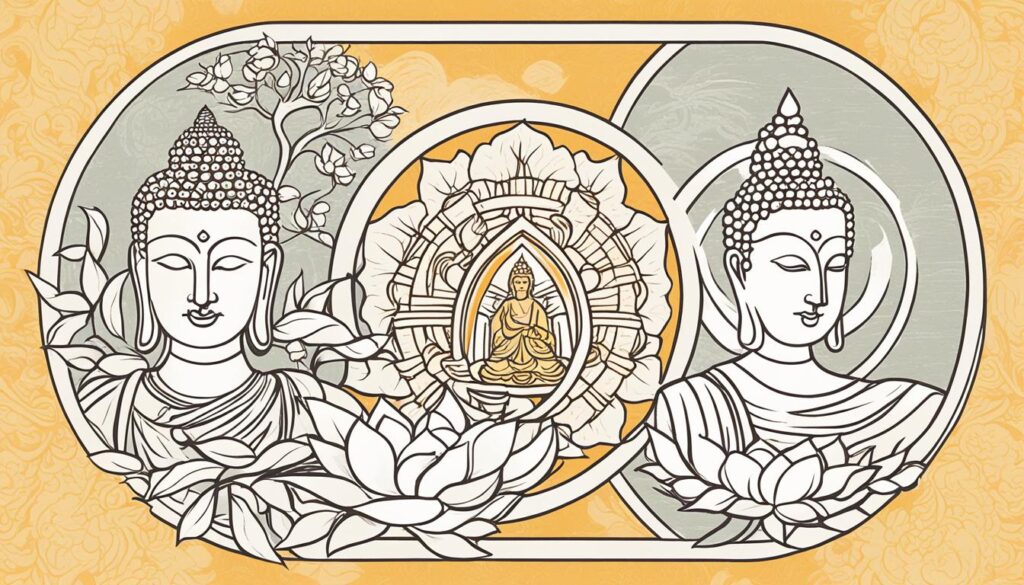Have you ever wondered how to navigate the complexities of life with wisdom and compassion? How to find inner peace and create harmony in your interactions with others? The ancient teachings of Buddhism offer a profound path towards ethical living and spiritual growth. Discover the transformative power of the 10 precepts of Buddhism, moral guidelines that can nourish your soul and lead you towards a more enlightened existence.
Key Takeaways:
- Explore the 10 precepts of Buddhism, ethical guidelines for personal and societal harmony.
- Understand how the precepts form a guide to living in accordance with enlightenment.
- Discover the Three Treasures Precept, the most general precept shared by all Buddhists.
- Learn about the Three Pure Precepts and how they guide enlightened behavior.
- Deepen your understanding of the Ten Great Precepts and their significance in the Buddhist life.
Understanding the Precepts of Buddhism
The precepts in Buddhism form a guide to living in accordance with enlightenment. They provide moral guidelines and ethical principles that enable individuals to lead a virtuous life and cultivate inner peace and harmony.
The 10 precepts of Buddhism encompass various aspects of speech, action, and livelihood, emphasizing the importance of mindfulness and ethical conduct.
These precepts are not rigid rules, but rather descriptions of enlightened behavior that lead to wisdom, charity, tenderness, benevolence, and empathy.
The 10 Precepts of Buddhism:
- Refrain from killing and respect the sanctity of all life.
- Avoid taking what is not freely given and practice honesty.
- Practice responsible and ethical behavior in your sexual relationships.
- Speak truthfully and refrain from spreading falsehoods.
- Avoid intoxication that clouds the mind and hinders clarity.
- Avoid gossip, slander, and harmful speech.
- Cultivate humility and refrain from boasting or belittling others.
- Practice generosity and give selflessly.
- Manage anger and cultivate patience and forgiveness.
- Avoid criticizing or defaming the Three Treasures of Buddhism (Buddha, Dharma, and Sangha).
By observing these precepts, individuals not only benefit themselves but also contribute to the well-being of others and society as a whole. These moral guidelines in Buddhism help foster compassion, kindness, and a sense of interconnectedness with all beings.

Committed practitioners of Buddhism strive to integrate the 10 precepts into their daily lives, ensuring their thoughts, words, and actions align with the teachings of the Buddha. Through earnest practice and self-reflection, one can gradually transform their character and awaken to the true nature of existence.
The Three Treasures Precept
The Three Treasures Precept is a fundamental aspect of Buddhism, cherished and followed by all practitioners. It serves as the cornerstone and guiding principle for a virtuous life on the Buddhist path. The Three Treasures refer to taking refuge in the Buddha, the Dharma (teachings), and the Sangha (community).
By seeking refuge in the Buddha, we acknowledge and honor the enlightened beings who have attained supreme wisdom and compassion. The Buddha serves as the ultimate teacher and guide, illuminating the path towards liberation and inner peace.
Refuge in the Dharma involves embracing the timeless teachings of Buddhism. The Dharma provides a roadmap for moral conduct, mindfulness, and the cultivation of wisdom. It encompasses the profound insights and practices that lead to enlightenment.
The Sangha represents the spiritual community of fellow practitioners. It offers support, companionship, and the opportunity to learn from others’ experiences. The Sangha provides a nurturing environment for spiritual growth and transformation.
By taking refuge in the Three Treasures, we establish a solid foundation for our spiritual journey. It fosters a harmonious understanding of the other precepts and paves the way for the cultivation of virtues such as compassion, loving-kindness, and equanimity.
Let us now delve deeper into the significance and impact of each aspect of the Three Treasures Precept.

The Three Pure Precepts
The Three Pure Precepts offer a profound understanding and guidance on how to live a virtuous life in accordance with Buddhist principles. By incorporating these precepts into your daily life, you can cultivate compassion, wisdom, and contribute to the well-being of others.
Cease from Evil
Ceasing from evil is the first of the Three Pure Precepts. It encourages you to refrain from harmful actions that cause suffering to yourself and others. By letting go of negative thoughts, words, and deeds, you create a space for positivity, kindness, and peace to thrive.
Do Only Good
Doing only good is the second precept. It prompts you to engage in actions that promote well-being and bring about positive change. By consciously choosing kindness, generosity, and integrity in your words and actions, you contribute to the creation of a harmonious and compassionate world.
Do Good for Others
Doing good for others is the third precept. It emphasizes the importance of selflessness and extending your compassion to others. By offering support, care, and assistance to those in need, you not only help alleviate their suffering but also deepen your own sense of purpose and fulfillment.
Embracing the Three Pure Precepts creates a foundation of ethical conduct, fostering personal growth and social harmony. By adhering to these precepts, you cultivate a compassionate heart, a wise mind, and contribute to the well-being of all beings.

| Precepts | Description |
|---|---|
| Cease from Evil | Refrain from harmful thoughts, words, and actions |
| Do Only Good | Engage in actions that promote well-being and positivity |
| Do Good for Others | Extend compassion and support to those in need |
The Ten Great Precepts
The Ten Great Precepts are essential guidelines for living a Buddhist life. By adhering to these precepts, you embrace a path of moral discipline and cultivate inner peace. Each precept acts as a compass, guiding your thoughts, speech, and actions towards kindness, compassion, and wisdom.
Refrain from Killing
Killing goes against the fundamental principle of non-harm in Buddhism. By refraining from taking the life of any living being, you develop empathy, respect for life, and foster harmony with all creatures.
Refrain from Stealing
Stealing disrupts the harmony and trust within society. By refraining from taking what is not freely given, you cultivate honesty, integrity, and promote justice.
Refrain from Abusing Sexuality
In Buddhism, sexual misconduct includes engaging in sexual acts that cause harm or violate the consent and well-being of others. By refraining from such behaviors, you cultivate loving-kindness, respect, and build healthy relationships.
Refrain from Speaking Untruthfully
Speaking untruths creates disharmony and confusion. By refraining from lying, gossiping, and spreading rumors, you cultivate honesty, trustworthiness, and meaningful communication.
Refrain from Selling the Wine of Delusion
The wine of delusion refers to intoxicating substances that cloud the mind and hinder clarity. By refraining from selling or consuming such substances, you cultivate mindfulness, clarity, and a balanced state of being.
Refrain from Speaking against Others
Speaking against others creates division and fosters negativity. By refraining from engaging in harmful speech, such as slander or verbal attacks, you cultivate harmonious relationships, understanding, and compassion.
Refrain from Being Proud of Myself and Belittling Others
Pride and belittling others stem from ego and foster separation. By refraining from arrogance and disrespectful behavior, you cultivate humility, empathy, and genuine interconnectedness.
Refrain from Holding Back in Giving
Holding back in giving stems from a mindset of scarcity and selfishness. By refraining from withholding generosity, you cultivate a spirit of abundance, compassion, and selflessness.
Refrain from Indulging Anger
Indulging anger leads to suffering and damages relationships. By refraining from feeding anger, you cultivate patience, forgiveness, and a calm mind.
Refrain from Defaming the Three Treasures
The Three Treasures, which encompass the Buddha, the Dharma (teachings), and the Sangha (community), hold deep reverence in Buddhism. By refraining from defaming or disrespecting these treasures, you cultivate reverence, gratitude, and respect for the spiritual path.

| Precept | Description |
|---|---|
| Refrain from Killing | Abstain from taking the life of any living being. |
| Refrain from Stealing | Avoid taking what is not freely given. |
| Refrain from Abusing Sexuality | Engage in ethical and consensual sexual behavior. |
| Refrain from Speaking Untruthfully | Avoid lying, gossiping, and spreading rumors. |
| Refrain from Selling the Wine of Delusion | Avoid selling or consuming intoxicating substances. |
| Refrain from Speaking against Others | Avoid harmful speech, including slander and verbal attacks. |
| Refrain from Being Proud of Myself and Belittling Others | Cultivate humility and empathy, avoiding arrogance and disrespectful behavior. |
| Refrain from Holding Back in Giving | Cultivate generosity and selflessness, avoiding withholding acts of giving. |
| Refrain from Indulging Anger | Cultivate a calm mind, avoiding fueling anger and hatred. |
| Refrain from Defaming the Three Treasures | Show reverence and respect for the Buddha, Dharma, and Sangha. |
The Precepts in Modern Buddhism
Precepts in modern Buddhism go beyond the confines of monastic life. They have practical application in daily life, serving as a foundation for ethical behavior and guiding practitioners in making choices that align with the teachings of Buddhism. By applying these precepts to your daily activities, you can cultivate mindfulness and compassion, fostering personal growth and a harmonious existence.
Applying the Precepts to Daily Life
Incorporating the Buddhist precepts into your daily life involves recognizing the impact of your actions and speech on yourself and others. It means refraining from harmful behaviors, such as killing, stealing, and speaking untruthfully, while actively engaging in acts of kindness, generosity, and understanding. By aligning your actions with the precepts, you bring mindfulness and intentionality to your interactions, creating a positive ripple effect that extends beyond yourself.
The Role of Repentance
Repentance plays a significant role in modern Buddhism, allowing individuals to reflect on their actions, acknowledge any transgressions, and make amends. It is a process of self-examination and taking responsibility for the consequences of our behavior. Repentance deepens one’s understanding of the precepts and encourages personal growth and transformation.
Receiving the Precepts
Receiving the precepts is a sacred ceremony in Buddhism. It signifies your commitment to living in accordance with the teachings and principles of Buddhism. During this ceremony, a teacher conveys the precepts to you, and you make a personal vow to uphold them in your daily life. Receiving the precepts is a powerful step in your spiritual journey and reinforces your dedication to ethical conduct.
| Benefits of Applying the Precepts | Challenges in Applying the Precepts |
|---|---|
|
|
Incorporating the precepts into your modern lifestyle may present challenges, but the benefits are transformative. By consciously applying the precepts, you can cultivate a more meaningful and purposeful existence, contributing to the well-being of both yourself and the world around you.
Living with the Precepts: Zen Teachings
Zen teachings provide invaluable guidance on how to incorporate the precepts into your everyday life. By embracing the wisdom of these teachings, you can cultivate a deeper understanding of the precepts and their application in your journey towards enlightenment. Several influential books delve into these teachings, offering practical insights and inspiring lessons for sincere practitioners.
“Everyday Zen”
Written by renowned Zen master Charlotte Joko Beck, “Everyday Zen” explores the essence of Zen practice and its relevance in our daily lives. This book invites readers to embrace the power of mindfulness and awareness, guiding them to live with the precepts as a guiding force for ethical and compassionate choices.
“Zen Mind, Beginner’s Mind”
Authored by Shunryu Suzuki, “Zen Mind, Beginner’s Mind” is a timeless classic that offers profound insights on Zen teachings and the precepts. This book emphasizes the importance of approaching each moment with a beginner’s mind, free from preconceptions, and open to the richness of experience.
“The Mind of Clover”
Written by Robert Aitken, “The Mind of Clover” explores the intersection of Zen philosophy and social engagement. Through the lens of the precepts, Aitken encourages readers to cultivate a deep sense of interconnectedness, compassion, and responsibility towards the world, fostering harmony and well-being in themselves and society.
“Opening the Hand of Thought”
In “Opening the Hand of Thought,” Zen teacher Kosho Uchiyama discusses the importance of mindful decision-making and the transformative power of the precepts. This book invites readers to reflect on their actions, cherish the present moment, and embody the teachings in their daily interactions with others.
“Precepts Study”
As the title suggests, “Precepts Study” by Zen teacher Reb Anderson offers a comprehensive exploration of the precepts. This guidebook provides practitioners with practical advice, reflection exercises, and real-life stories to deepen their understanding and integration of the precepts into their spiritual path.
By immersing yourself in these insightful works, you can gain a deeper appreciation for the profound impact that living with the precepts can have on your spiritual journey. These Zen teachings inspire practitioners to embrace the everyday Zen of mindfulness, compassion, and sincere practice, nurturing a harmonious and awakened mind.
Conclusion
By embracing the precepts of Buddhism, you can embark on a transformative journey towards personal and societal harmony. The teachings of Buddhism offer a profound guide for ethical living, providing a path to cultivate mindfulness, compassion, and wisdom in your daily life.
Integrating the precepts into your thoughts, speech, and actions allows you to transcend self-centeredness and embrace a broader perspective. As you cease from harmful behavior and do good for others, you create a ripple effect of positive change, not only within yourself but also in the world around you. Embracing the precepts is an invitation to participate in the ethical transformation that our society desperately needs.
Through the practice of the precepts, you can cultivate a deep sense of personal integrity and a genuine connection with others. By refraining from harming, speaking untruthfully, or indulging in anger, you create a space for empathy, understanding, and harmony to thrive. It is through these ethical choices that personal growth and societal transformation are made possible.
As you embark on this journey, remember that the precepts of Buddhism are not rigid rules but invitations to examine your intentions and actions. Embracing the precepts requires a commitment to continuous learning and self-reflection, fostering a lifelong pursuit of ethical conduct. By embracing the precepts, you contribute to a more compassionate and harmonious world, both within and beyond yourself.
FAQ
What are the 10 precepts of Buddhism?
The 10 precepts of Buddhism are ethical guidelines that provide a path towards inward peace and harmony with the universe. They include refraining from killing, stealing, abusing sexuality, speaking untruthfully, selling the wine of delusion, speaking against others, being proud and belittling others, holding back in giving, indulging anger, and defaming the Three Treasures.
What is the Three Treasures Precept in Buddhism?
The Three Treasures Precept involves taking refuge in the Buddha, the Dharma (teachings), and the Sangha (community). This precept provides guidance and harmonizes our understanding of the other precepts.
What are the Three Pure Precepts in Buddhism?
The Three Pure Precepts involve ceasing from evil, doing only good, and doing good for others. By adhering to these precepts, one seeks to harm no living thing and act in accordance with truth and benefit.
How can the precepts of Buddhism be applied to daily life?
The precepts in modern Buddhism are not limited to monastic life but can be applied to daily life. They serve as a foundation for ethical behavior and guide practitioners in making choices that align with the teachings of Buddhism.
What is the role of repentance and receiving the precepts in Buddhism?
Repentance and receiving the precepts play a significant role in deepening one’s understanding and commitment to the Buddhist path. They provide an opportunity for reflection, purification, and a renewed dedication to living in accordance with the precepts.
Are there any resources available to help in understanding and living with the precepts?
Yes, Zen teachings offer practical guidance on living with the precepts. Books like “Everyday Zen,” “Zen Mind, Beginner’s Mind,” “The Mind of Clover,” “Opening the Hand of Thought,” and “Precepts Study” delve into the application of the precepts in everyday life and provide valuable insights for sincere practitioners.
How can embracing the precepts lead to ethical transformation?
Embracing the precepts of Buddhism can lead to an ethical transformation that brings personal and societal harmony. By following the teachings of Buddhism and integrating the precepts into our daily lives, we can cultivate mindfulness, compassion, and wisdom, leading to a more fulfilling and peaceful existence.

